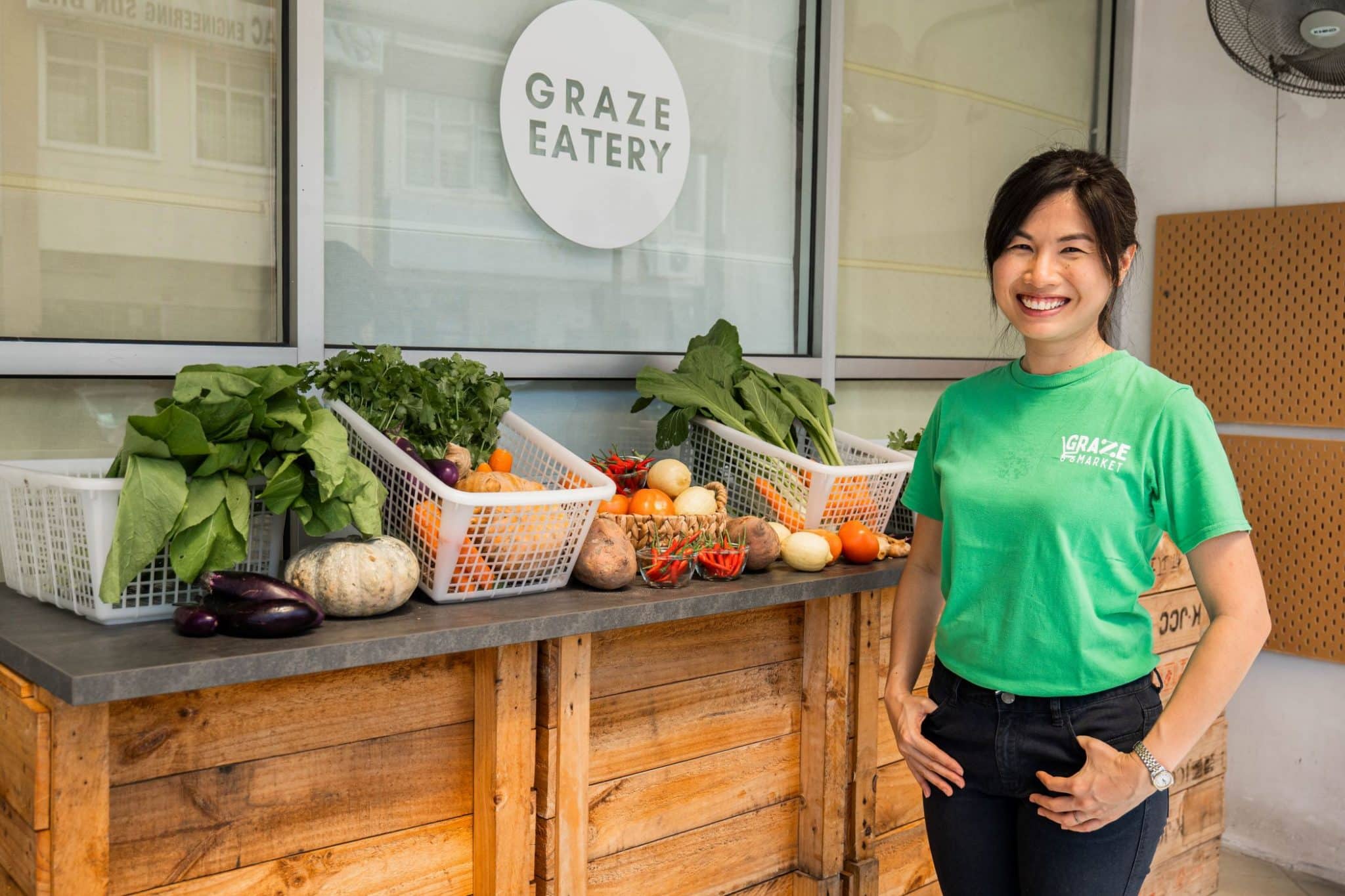From Peranakan traditions to Passover feasts: Cookbook author Christopher Tan’s expressions of faith
by Gemma Koh // December 12, 2020, 1:04 am

Besides his obvious love for food, Christopher Tan's love for his Creator emerges in his writing. Tan, pictured with his vintage coil whisk, has been writing about food for over two decades and teaching cooking for half of that. All photos courtesy of Christopher Tan unless otherwise stated.
Comb through food journalist Christopher Tan’s bestselling cookbooks, and you glean such quirky nuggets as how Tan and his “gang of Pocky fanatics” have tried 191 flavours of Pocky, the iconic Japanese pretzel stick from Glico.
That was at the time Tan was writing his 10th cookbook, which was released in 2015.
It’s one of the food obsessions that the cooking instructor and cookbook author of 13 books (and counting) shares in Nerd Baker: Extraordinary Recipes, Stories & Baking Adventures from a True Oven Geek.
“I love how absolutely stuffed the Bible is with food metaphors: Bread, wine, salt, yeast, wheat, grapes, honey.”
In between recipes of pies and Mocky (his version of Pocky “because you can”) are delicious anecdotes of his formative years and seminal food moments – helping his grandma prepare lunar new year cookies using the family oven.
Watching his mother build kueh lapis “layer by fragrant layer”.
Churning out chocolate roulades at night in high school, while the cool kids were went in for other pursuits like drama and “covert smoking”.
In university he studied psychology (“with a major in Kenwood”). It is not so much of stretch from what he currently does, when you consider that “baking is the most affordable form of therapy”.
Tan’s writing often contains a tantalising trail of breadcrumbs to his faith.
In Nerd Baker, he wrote that baking teaches the virtues of “patience, foresight, alertness, precision, generosity and faith”. The first of the names on the acknowledgement page is: “God, who is my beginning”.
In his latest heritage food book, The Way of Kueh, which won the Book of the Year 2020 award (Singapore Book Publishers Association) for non-fiction, he speaks of kueh as, among other things, “a way to bless others”.
The 48-year-old Peranakan mulled over the fragrant connection between faith and food in an interview with Salt&Light:
Is your food writing influenced by your faith?
I love how absolutely stuffed the Bible is with food metaphors: Bread, wine, salt, yeast, wheat, grapes, honey, a feast, a laden table.
“For me, teaching others about food is really about teaching them to pay attention to Creation.”
And these of course are also deeply connected with agrarian metaphors: Gardens, vineyards, harvest, shepherding, fishing and so on.
Farmers and cooks, as people who work close to the land and are fingers-deep in the messiness of reality, are able to connect with all these metaphors on a different level than most, I think.
For example, if you do a lot of pickling and curing, you become aware of all the subtleties of salt as an agent of cleansing, preservation and seasoning, and also of how infinitesimal differences in mineral content affect the taste of salt … and so Matthew 5:13 will be a lot sharper to you, as well as the symbolism of passages like 2 Kings 2 where Elisha “cleans” a spring with salt.
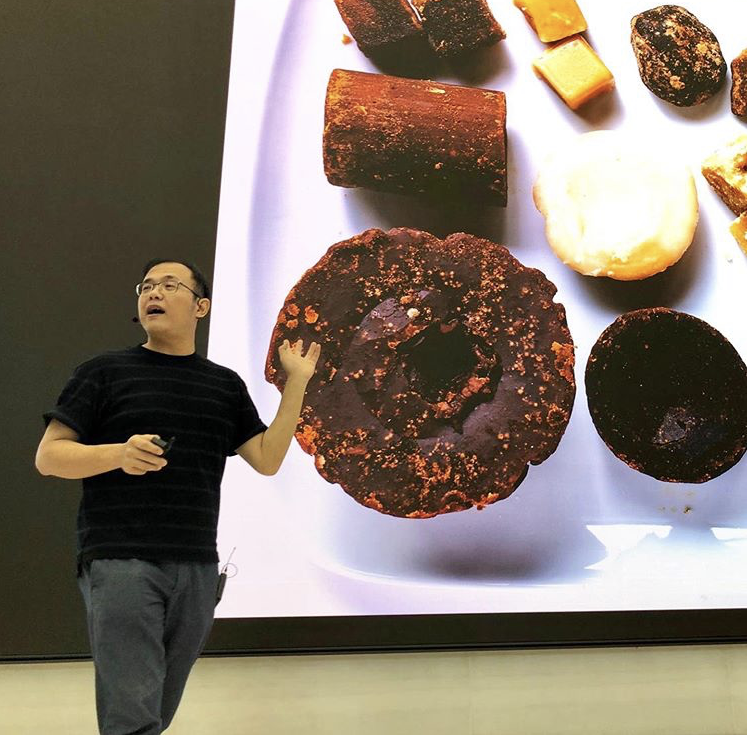
“Teaching others about food is really about teaching them to revel and delight in all the flavours and aromas and textures of the edible created world,” said Christopher, pictured here giving a talk at Apple Singapore. Photo from Apple Singapore via instagram.com/thewayofkueh.
Let’s also not forget that there is a recipe in the Bible. In Exodus 30, God dictates a recipe for perfumed oil directly to Moses. I love how precise its ingredient quantities are. To me, this speaks volumes about our Creator’s attention to detail.
For me, teaching others about food is really about teaching them to pay attention to Creation – to revel and delight in all the flavours and aromas and textures of the edible created world.
Who are the earliest “home cooks” (lay people) and “chefs” (church leaders) who influenced your walk with God?
My journey to faith was more gradual than dramatic: At the beginning I was ignorant of and indifferent to God, and, by the end, “I knew that I knew that I knew” He is real, and that He cares for me.
“We sang a hymn at assembly every week – though half the students were Indian, Jewish or otherwise non-Anglo-Saxon.”
My first proper exposure to Christianity was as a teenager, after my family moved to the UK.
I attended a CofE (Church of England) school where Scripture was a taught subject at primary level. We sang a traditional hymn at assembly every week – even though half the students were Indian, Jewish or otherwise non-Anglo-Saxon. I absorbed the hymnody more easily than the Scripture.
During my high school days, the integrity and the modest and upright character of my form teacher – a Christian – made a big impression on me.
Later, returning to Singapore to serve National Service, I had a platoon mate during BMT who would not go home on our nights off, but went street witnessing instead – his commitment to his faith amazed me.
Around the same time I started attending a local church on and off.
I accepted Christ, and shortly after ROD-ing (completing National Service), I got baptised and went back to the UK for university.
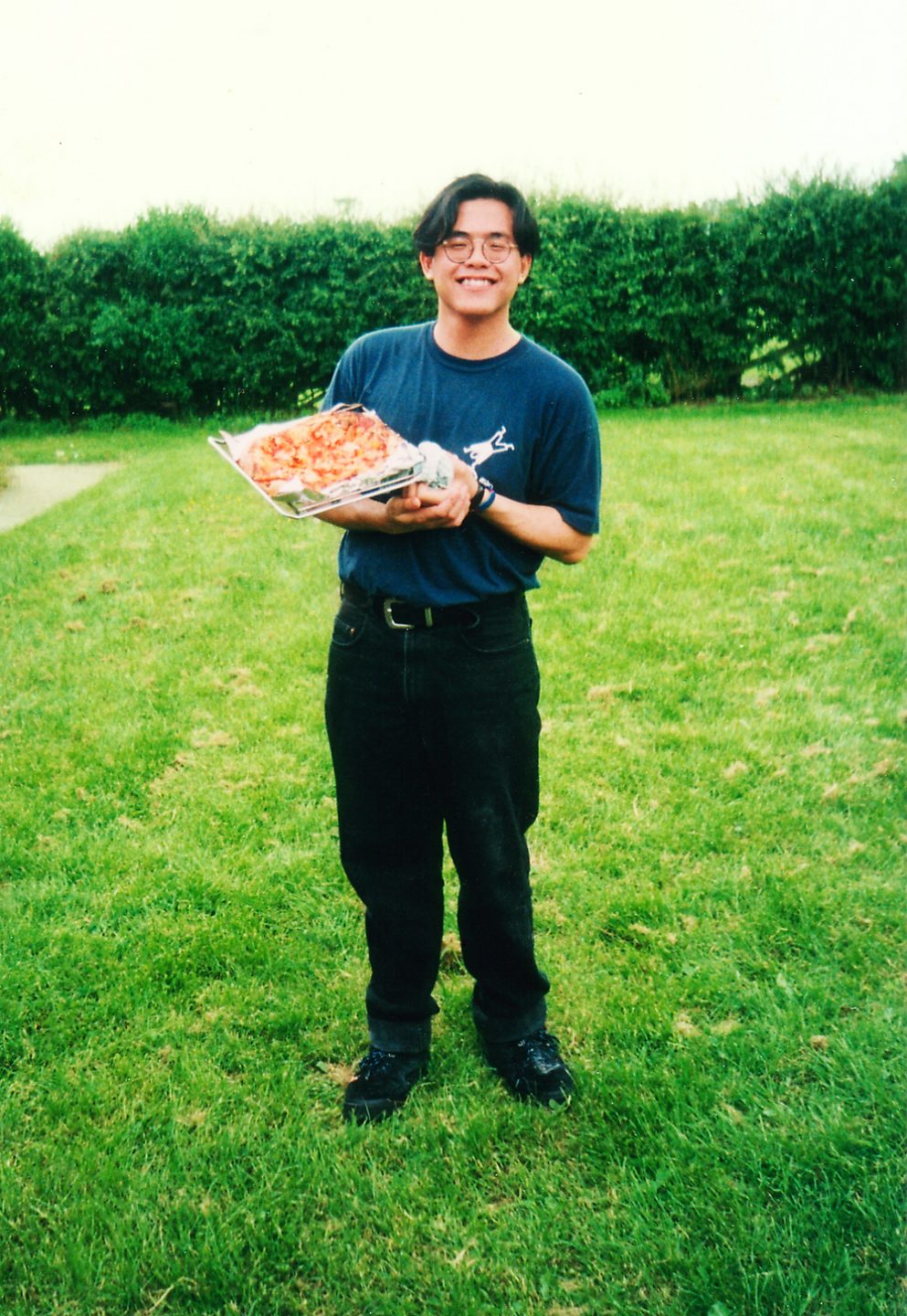
Christopher, during his university days, making pizza for everyone while on a weekend away with the Christian Union folks. “My university’s Christian Union pulled together students from many different branches of the faith. Among my friends were traditional Anglicans, Presbyterians whose churches only sang metrical psalms, and charismatic evangelicals.”
I seized the chance to visit different churches and experience different styles of services. I joined a gospel choir. I went to a Christian summer camp.
“Without even being touched, they beat a retreat after a group of us prayed for God to thwart them.”
At prayer meetings, I saw people getting delivered from demonic oppression and people getting slain in the Spirit.
I experienced overt spiritual warfare for the first time when a couple of apparently possessed people tried to vocally and physically disrupt a big evangelistic event. Without even being touched, they just beat a retreat after a group of us prayed for God to thwart them.
We were shaken, but also felt affirmed that God must have had something major planned in order for such opposition to occur. The event powerfully ministered to those who came.
After uni, I returned to Singapore and started serving in various church and parachurch ministries, mostly music-related.
How are the secrets of a good loaf related to God’s instructions for leading a good life?
During Circuit Breaker, I spent time getting to grips with sourdough bread, which is made with wild yeasts corralled from the environment.
“If I can be so tender with a loaf of bread, is God not infinitely more diligent and careful?”
The whole process is lengthy, highly sensitive to environmental conditions, and requires a large commitment of time, effort and inevitably emotion – and it illuminates, if not recapitulates, how God shapes us:
- I nurture the yeast by feeding it regularly to help it grow strong and vigorous.
- I subject the dough to a careful mix of firm and gentle handling, kneading it, stretching it and proving it so that it can mature and develop properly.
- I bake the loaf in an oven, whose fierce and refining heat is needed to help the bread achieve its full and final flavour.
If I can be so tender with a loaf of bread, is God not infinitely more diligent and careful as He feeds, proves, stretches, tests and fire-refines us?
If the yeasts misbehave and thwart my efforts to get a properly baked loaf, causing me frustration and sorrow, does our sin and rebellion not impact God infinitely more?
You repeatedly write about generosity. What does it mean to you?
Matthew 6:2-4, Luke 6:30, Romans 8:32 and 2 Corinthians 9:6-8 pretty much sum up giving and generosity for me – cheerful, sacrificial, unconditional, out of what God has liberally given us. Secret, if possible.
The most priceless gifts which others have bestowed on me have been intangibles – generous gifts of time, attention, care.
When I was in uni, I caught chickenpox one semester and was confined to my dorm room for at least a week.
One of my coursemates volunteered to bring me dinner every day – my room was not near the dining hall – and did so selflessly and without complaining.
You also often write about the value of waiting.
Pretty much every book project and every major work project I have embarked on only kicked off after time spent waiting on God.
When I first entered the working world, God gave me to understand that I should focus on my character and spiritual formation, and let Him look after my work and reputation.
“Every major work project I have embarked on only kicked off after time spent waiting on God.”
I’m not terribly savvy at pitching myself to people or at hunting out opportunities, but when I submit myself to God in faith that He knows better than I do what I need and where I should go next, He sets wheels in motion.
And in truth, every single time I have tried to “further myself” by striving to make important connections or talk myself up to people, my efforts have completely, embarassingly flopped.
So I take no credit at all for any work success or achievements. It’s all God.
How does the divine inspire your creativity?
If I am rooted in Christ, by whom all things were created, I need never fear running out of inspiration.
We are all made in the image of God, which means that having a creative impulse is part of being human.
“If I am rooted in Christ, by whom all things were created, I need never fear running out of inspiration.”
In addition, believers have an open hotline to the Creator.
So if we look after our connection to Him, our well will not run dry of creative juice.
Even in what may feel like a dry season, things are working “under the hood”. So we just do a Mary and stay at His feet.
I am here referring to the day-to-day (but divinely empowered) practice and discipline of being centred in God so as to exercise our creative gifts fully and fruitfully.
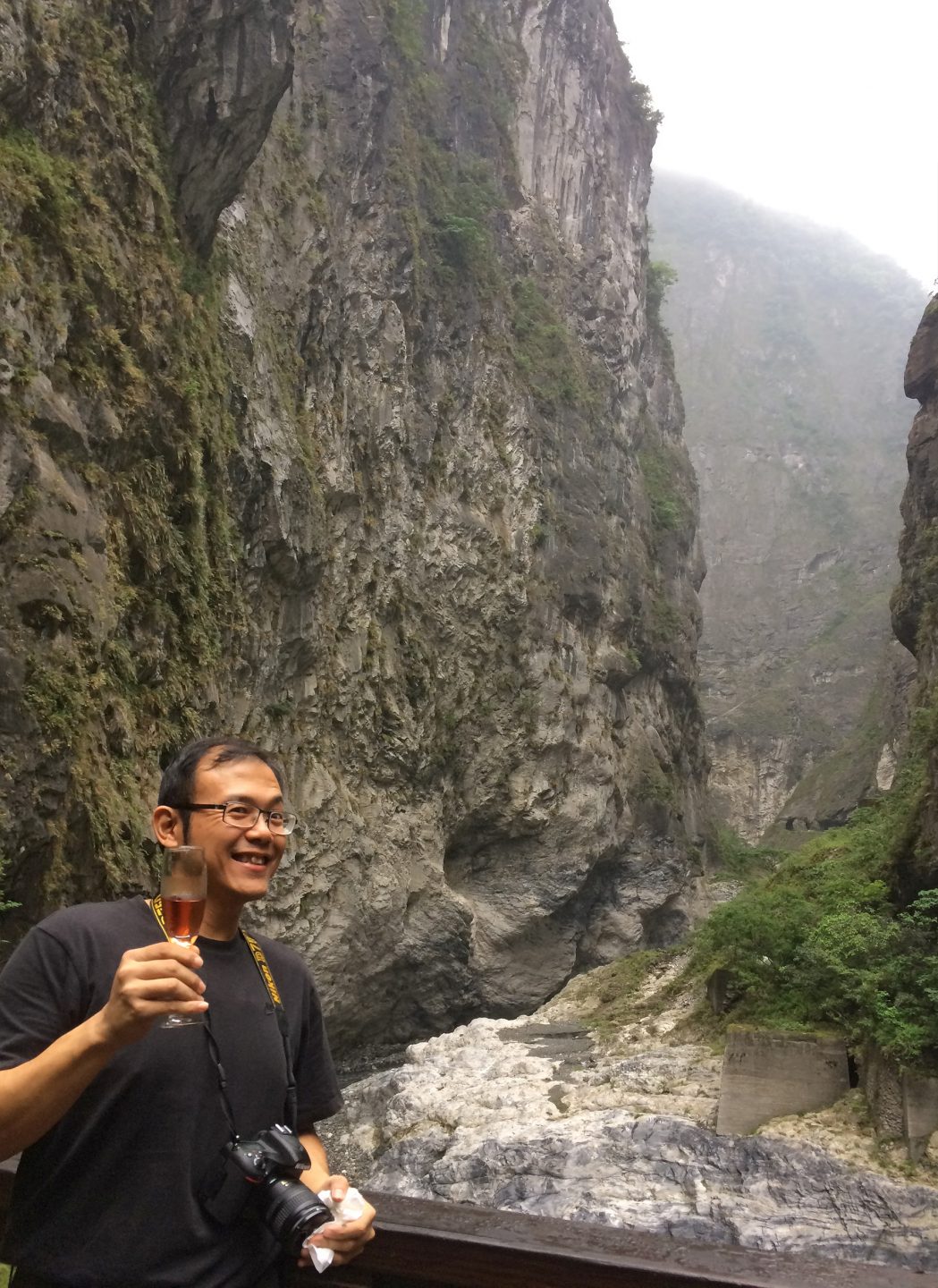
At Taroko Gorge, on a work trip to Taiwan. Christopher photographed his last two cookbooks himself.
When God gives me the impetus to do specific work, He also gives me little nudges and indications to keep me on the right track.
While researching my most recent book, The Way of Kueh – a project which God seeded and watered by making many things align to render it possible – I was trying to find a copy of an obscure vintage cookbook.
It was decades out of print and impossible to locate online. Not two weeks after my fruitless searches began, I “randomly” walked past a homeware shop I’d never been to before. It was clearing old stock, and I found the cookbook on their sale rack. A few days later, the shop ceased selling books altogether.
This was not the first time God has caused a needed book to seemingly fall into my lap from out of the blue.
Have there been opportunities for ministry through your work?
A couple of times in recent years, I had the chance to cook Passover meal dishes and help lead a Messianic Jewish Passover service for an arts group and for a friend’s church.
“Every bite became charged with meaning, and we were all left hungrier in anticipation for the final Feast when Jesus returns.”
There is such deep symbolism in the food elements of Passover – bitter herbs, salt-water “tears”, the sacrificed lamb.
It was an indelibly, ineffably rich and potent experience labouring together with friends to help each other understand and celebrate the occasion.
Every bite became charged with meaning, and we were all left hungrier with anticipation for the final Feast when Jesus returns.
How has Covid evolved your work?
To the loner and introvert sides of my personality, the social distancing and stay-at-home protocols are a huge temptation to squirrel myself away to avoid social anxiety and having to deal with people.
And although I work from home as it is, the CB (Circuit Breaker) period has been corrosive to the boundaries between work and non-work life.
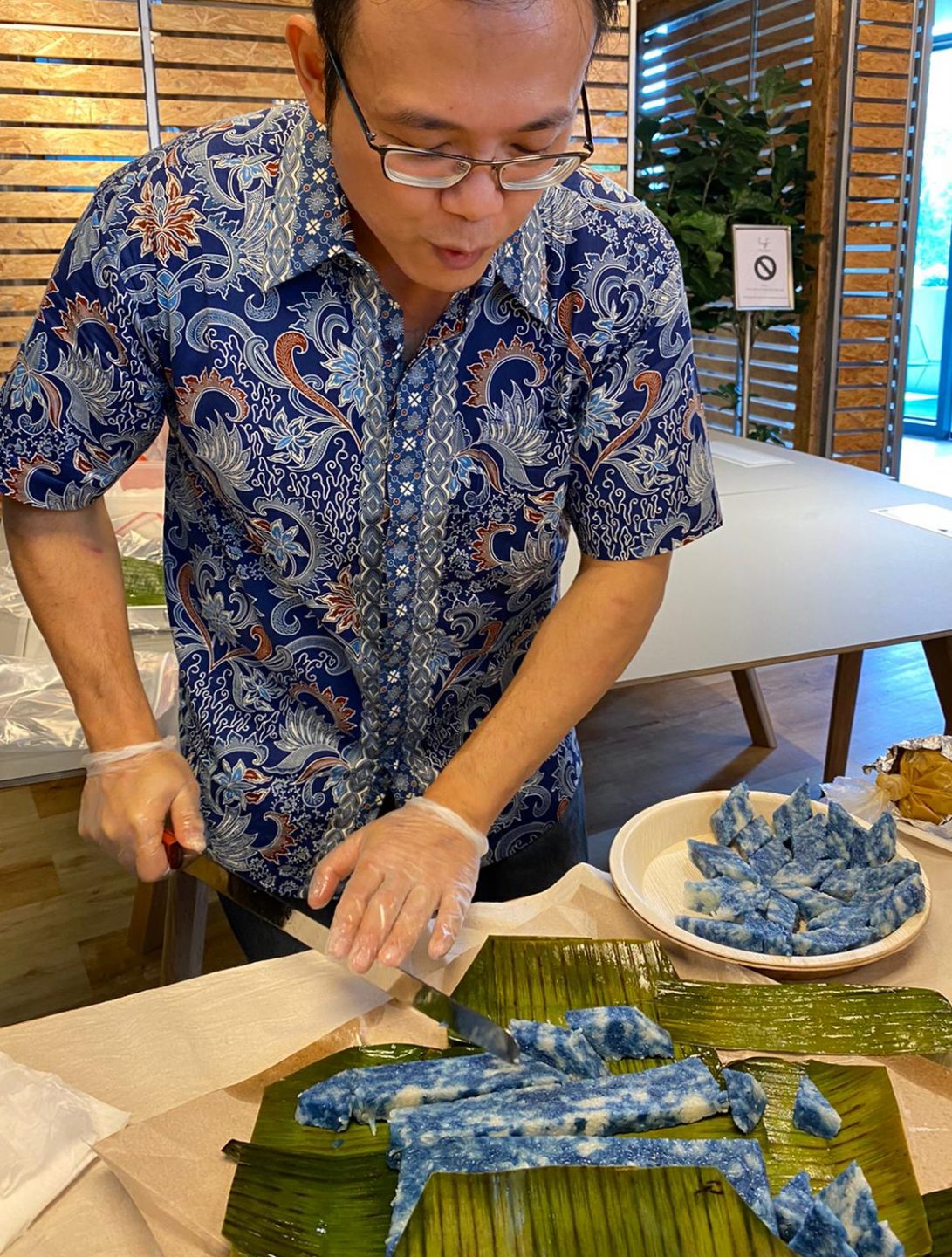
Christopher cutting up pulot tartar (pressed sticky rice) during the launch of his award-winning heritage food book, The Way of Kueh.
2020 has been a year of nonstop curveballs, and really all we can do is wait in faith and not focus on the thorns and thistles – the lack of work, retrenchment, not being able to visit family and extended family, not being able to fellowship in church and so on.
“All we can do is wait in faith and not focus on the thorns and thistles.”
In terms of personal thistles – well, my oven just broke down yesterday, and I haven’t even done any Christmas baking yet.
We cope with all these things best with the help of the spiritual discipline of abiding in Christ, via bible-reading, prayer, contemplation, fasting and so on.
It’s a discipline I struggle with, but this season is making me realise how crucial it is.
Most people associate Christmas with food. What does Christmas mean to you?
The most meaningful Christmases I’ve had were the ones when I performed with Agapella – the acapella group I was part of for about a decade – singing and busking at churches and malls to bring the story of Jesus to a listening audience.
“Emmanuel refused to social distance Himself from us rabble-rousing sinners and instead came to dwell with us.”
But I’m not overly enamoured with “Christmas” as a commercialised, lavishly indulgent, shopping-centric and eating-focused festival – it distracts from the real story of Christ’s first coming.
My Christmases have always been fairly quiet – mainly church and meals with my immediate family.
As a Peranakan Chinese Christian, it feels more appropriate to festoon traditions around Chinese New Year – spending time with family and extended family, coming together to prepare and enjoy meals together, and blessing one another with gifts and acts of service.
I don’t celebrate CNY as a religious festival but, going by its agrarian origins, more as a marking of the seasons – the coming of spring and new beginnings, which of course has meaning in a Christian context.
Perhaps the enforced streamlining of the year-end festive season under Covid protocols will be helpful in encouraging us all to have a more contemplative Christmas.
Perhaps we can mull over how Emmanuel refused to social distance Himself from us rabble-rousing sinners and instead came to dwell with us. The song Labor of Love sums it up for me.
MORE STORIES OF CHEFS WITH FAITH:
Candlenut’s Malcolm Lee was on brink of hanging up his apron before his Michelin star
Desi Trisnawati: Helping others succeed was part of her MasterChef Indonesia victory
We are an independent, non-profit organisation that relies on the generosity of our readers, such as yourself, to continue serving the kingdom. Every dollar donated goes directly back into our editorial coverage.
Would you consider partnering with us in our kingdom work by supporting us financially, either as a one-off donation, or a recurring pledge?
Support Salt&Light

